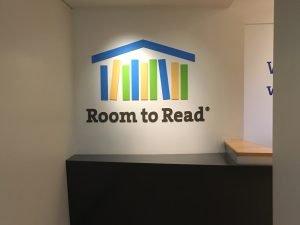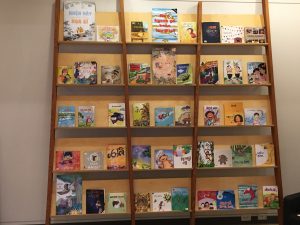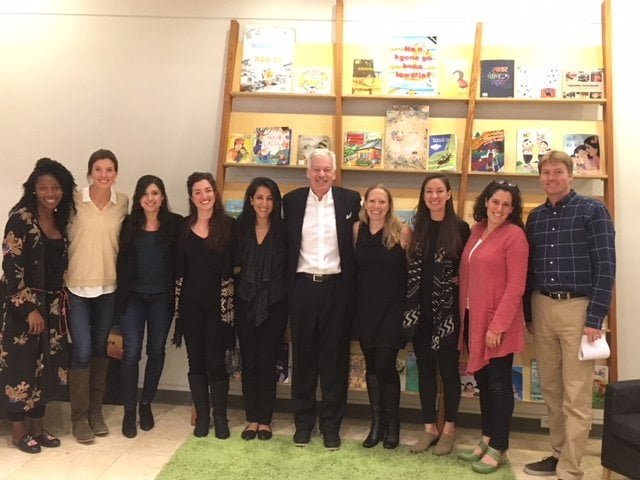Better Than Most is a regular feature of The Business of Giving, examining the best places to work among social good businesses and nonprofit organizations.
Denver: And this evening, you will be visiting 465 California Street in San Francisco, and the headquarters of Room to Read, an organization that is focused on girls education and children’s literacy in Asia and Africa. We’ll begin with Geetha Murali, the Chief Executive Officer of Room to Read and then hear from other members of the team.
 Geetha: Room to Read was founded in 2000 with a very simple goal of bringing books to children around the world. Since then, we’ve grown to reach over 20,000 communities, almost 12.4 million children, with a focus on literacy and gender equality and education
Geetha: Room to Read was founded in 2000 with a very simple goal of bringing books to children around the world. Since then, we’ve grown to reach over 20,000 communities, almost 12.4 million children, with a focus on literacy and gender equality and education
Julie: I think that even in meetings that come together, it’s like all levels of staff are pulled in to meetings. People’s voices are welcome in all levels and taken very seriously at all levels. It’s not a top-down, decision-driven organization which I think is one of our strengths that really allow creative, different ideas to come to the table. You see this too not just at our global office but a lot of our best ideas come from the field. Come from the people who are closest to the beneficiaries. That’s one of the things that I love most about Room to Read.
Florence: The background everyone has is incredibly impressive, and the level of ambition and drive that everyone has is inspiring. To give you some examples, I could go around even just my direct team and tell you everything that everyone’s working on; but everything that everyone’s working on outside of the organization. We have two members of our staff of our team who are currently writing books; books on their own about their lives and topics that interest them. Julie, who is sitting next to me, is a photographer, and she does family portraits. I am interested in photojournalism, and I do that outside of my work as well. One of our other colleagues is interested in starting podcast. The people who work here are incredibly talented and driven, and you see that reflected in the work that we do but also outside of our work and the drive that everyone has.
One example is that one of our colleagues had foot surgery recently, and she’s been out of the office for a couple of weeks. On Friday, a couple of us went over to her house and worked remotely from her house to keep her company. That type of relationship where we know she’s going crazy sitting at home yet we have the flexibility at work to work remotely but we choose to go and support her and just work together side by side is something that is fun and special.
Geetha: Similarly, with promotions, we talk about the ability to identify talent all over the organization. We’re not tied to traditional promotion policies. We look at people’s functional capabilities as well as their aspirational capabilities. How much do they want to contribute to this mission. And what have they done to demonstrate their commitment to the organization’s goals.
 Erica: It’s almost a running joke at this point that there are going to be some tears at our all-hands meetings. It’s not sad tears, it’s tears because the stories that we hear in that meeting when we’re all together, they’re so inspirational. They move people to tears. Certainly a lot of the stories that will do this are from the field. We have stories from our field offices, our country offices. Stories from people who usually work in San Francisco, having the honor and privilege of going and seeing that work first hand. It also strikes me too that I have been personally moved to tears and have seen my co-workers as well. When we’re talking about our fellow co-workers.
Erica: It’s almost a running joke at this point that there are going to be some tears at our all-hands meetings. It’s not sad tears, it’s tears because the stories that we hear in that meeting when we’re all together, they’re so inspirational. They move people to tears. Certainly a lot of the stories that will do this are from the field. We have stories from our field offices, our country offices. Stories from people who usually work in San Francisco, having the honor and privilege of going and seeing that work first hand. It also strikes me too that I have been personally moved to tears and have seen my co-workers as well. When we’re talking about our fellow co-workers.
Megan: I wanted to touch on a fun tradition that we have at Room to Read which is bringing the yak bell in celebration of big events or accomplishments that we have as a team. I think it’s nice because it connects us. It is unique and fun and it connects us to our history as well where Room to Read started om Nepal with our mascot, Zak The Yak with books on his back. Whenever we have something fun to celebrate or whenever we hear the yak bell ringing, we know there is a good announcement to follow.
Brian: I also like people have interests. There’s a run club here. In the summer people go once a week out running. I ran a half marathon with a few people. Also book club. I never was a part of a book club, so I joined that. I’ve done a lot of stuff I never would have done at other jobs. I just really appreciate the family feel here. It’s great.
Sanjana: Probably a good 60% of that meeting that happen quarterly was focused on everyone going around through the Skype meeting and through camera showing a recent picture of themselves and explaining the background of that picture and people being able to comment on that. The main focus of that meeting was really just getting to know each other, and there was a lot that needed to be done, and there was a lot that was accomplished on that meeting. There were a lot of results that came out of that meeting but a huge part of it was just getting to know each other and being able to build those relationships. I think that’s so important. It’s something that we really do focus on while still achieving results which I think is very exciting to see.
 Kimberly: I find it really refreshing that the management here and specifically my manager has really prioritized my creative growth and from developing new skills that I didn’t even have when I walked in the door like video editing to making that a key aspect of my role. That is now a huge passion of mine. Looking to explore further even beyond my work here to just having ideas and being able to run with them and flush them out into things that are much larger than a seed. That’s been something that’s really refreshing, and there’s a lot of autonomy and growth that I think is accelerated because of that.
Kimberly: I find it really refreshing that the management here and specifically my manager has really prioritized my creative growth and from developing new skills that I didn’t even have when I walked in the door like video editing to making that a key aspect of my role. That is now a huge passion of mine. Looking to explore further even beyond my work here to just having ideas and being able to run with them and flush them out into things that are much larger than a seed. That’s been something that’s really refreshing, and there’s a lot of autonomy and growth that I think is accelerated because of that.
Julie: There is a tremendous amount of trust that we have in each other. Trust that even when we mess up, even if we royally mess up, it was not because we didn’t try harder, think hard. That trust in each other goes a really long way. The teamwork that we have together and because we are working globally, there’s a lot of room for misinterpretation. Misinterpreting emails, misinterpreting WhatsApp messages. Misreading something but because there is that foundational trust in each other, we’re able to turn things around. We’re able to make the work move forward.
Erica: We recently redid our onboarding materials for a new staff that come on. One of the things I think externally that a lot of people know about Room to Read is just how fantastic our materials looked. Our donor materials, our annual report; I cannot say enough about the annual report, to our nearly done website, our blogpost; everything like that. I think what Megan did pretty recently was she took that same level of care that we throw out to our external donors and people who are interested in our work, and we apply that to our own employees. We have this wonderful travel journal now that people get when they come on.
Danielle: The third thing is that we hire fiercely competitive people when it comes to things that are not work-related. So come here on Halloween and you will find a very competitive Halloween costume contest where people are dressed up individually or as groups. Two hours before that, the bathroom will be filled with hairspray and different things happening as people prepare for their Halloween costume. Somehow, we have found people that like that competition in the lighter side of the work.
 Brian: I’m an accountant here, so I’m sort of indirectly linked to the project work. I don’t get to go out and see all the wonderful work that’s being done. All those times brought back, and we can see people talk about it, show the videos and see the kids’ smiling faces and all the work we’ve done. I think it’s really really cool. I really appreciate that we do that on a pretty regular basis here.
Brian: I’m an accountant here, so I’m sort of indirectly linked to the project work. I don’t get to go out and see all the wonderful work that’s being done. All those times brought back, and we can see people talk about it, show the videos and see the kids’ smiling faces and all the work we’ve done. I think it’s really really cool. I really appreciate that we do that on a pretty regular basis here.
Erica: But one thing that we have done this year. I just love being part of these meetings and everything is we actually did a focus group afterwards. We had standard survey monkey thing that we used to gather this information but then we gather the different groups at Room to Read. We had supervisors, we had non-supervisors, we had some for the staff in this office, we had global webinars for our staff around the globe. It was such an incredible thing to see other people not just, I answered something. Who knows where it goes. Just having that atmosphere to talk with your fellow colleagues, and again an incredibly safe fostering place where you can get ideas out. It wasn’t anything where people were just griping about what they didn’t like. In fact, it was almost the complete opposite. So many people had so many ideas. I think we can do this. I think we can do this.
Megan: One of the things I can talk about is professional development. Particularly at Room to Read, I’ve been so appreciative of the stretch opportunities that I’ve been provided. I was able to demonstrate that I can get my job done and then as soon as that happened, there were all kinds of opportunities to stretch my skills, to develop new skills, to roll out initiatives and projects worldwide which is something that I wouldn’t have really talked about doing when I first joined Room to Read but I think that it was having supervisors who believed in me and saw that and thought about and provided those opportunities which has been really critical in my own development and career.
Sanjana: What is the nitty-gritty work that makes you a global office and that makes sure that your team feel really keyed in and special and that someone from India, someone from Nepal, the US, and Australia and Switzerland can all feel included in this mission not just as a worker but as a person, and I think that always stands out to me consistently in all work that we do.

Denver: I want to thank OT for helping to organized my visit and to all those who participated in this piece, Kimberly Gomez, Julie Ellis, Florence Middleton, Danielle Reichner, Erica Cuellar, Megan Litwin, Brian Cavanaugh, and Sanjana Khoobchandani. If you would like to hear this again, read the transcript or see pictures of the participants and the offices, come to www.denver-frederick.com. And we’ll have posted there for you my full interview with Geetha Murali, the CEO of Room to Read.
The Business of Giving can be heard every Sunday evening between 6:00 p.m. and 7:00 p.m. Eastern on AM 970 The Answer in New York and on iHeartRadio. You can follow us @bizofgive on Twitter, @bizofgive on Instagram and at http://www.facebook.com/BusinessOfGiving

